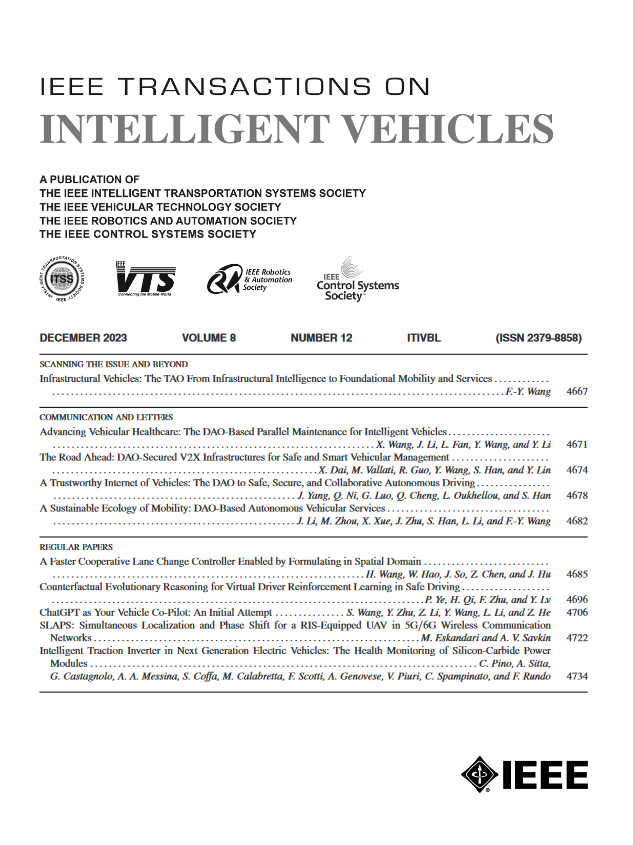Dream to Drive With Predictive Individual World Model
IF 14
1区 工程技术
Q1 COMPUTER SCIENCE, ARTIFICIAL INTELLIGENCE
引用次数: 0
Abstract
It is still a challenging topic to make reactive driving behaviors in complex urban environments as road users' intentions are unknown. Model-based reinforcement learning (MBRL) offers great potential to learn a reactive policy by constructing a world model that can provide informative states and imagination training. However, a critical limitation in relevant research lies in the scene-level reconstruction representation learning, which may overlook key interactive vehicles and hardly model the interactive features among vehicles and their long-term intentions. Therefore, this paper presents a novel MBRL method with a predictive individual world model (PIWM) for autonomous driving. PIWM describes the driving environment from an individual-level perspective and captures vehicles' interactive relations and their intentions via trajectory prediction task. Meanwhile, a behavior policy is learned jointly with PIWM. It is trained in PIWM's imagination and effectively navigates in the urban driving scenes leveraging intention-aware latent states. The proposed method is trained and evaluated on simulation environments built upon real-world challenging interactive scenarios. Compared with popular model-free and state-of-the-art model-based reinforcement learning methods, experimental results show that the proposed method achieves the best performance in terms of safety and efficiency.梦想驾驶预测性个人世界模型
在复杂的城市环境中,由于道路使用者的意图是未知的,如何做出反应性驾驶行为仍然是一个具有挑战性的课题。基于模型的强化学习(MBRL)通过构建一个可以提供信息状态和想象力训练的世界模型,为学习反应性策略提供了巨大的潜力。然而,相关研究的一个关键局限在于场景级重构表征学习,它可能忽略了关键的交互车辆,并且很难对车辆之间的交互特征及其长期意图进行建模。为此,本文提出了一种基于预测个体世界模型(PIWM)的自动驾驶MBRL方法。PIWM从个体层面描述驾驶环境,通过轨迹预测任务捕捉车辆之间的交互关系和意图。同时,与PIWM共同学习行为策略。它在PIWM的想象中训练,并利用意图感知的潜在状态有效地在城市驾驶场景中导航。所提出的方法在建立在现实世界具有挑战性的交互场景的模拟环境中进行了训练和评估。实验结果表明,与目前流行的无模型和基于模型的强化学习方法相比,该方法在安全性和效率方面都达到了最好的效果。
本文章由计算机程序翻译,如有差异,请以英文原文为准。
求助全文
约1分钟内获得全文
求助全文
来源期刊

IEEE Transactions on Intelligent Vehicles
Mathematics-Control and Optimization
CiteScore
12.10
自引率
13.40%
发文量
177
期刊介绍:
The IEEE Transactions on Intelligent Vehicles (T-IV) is a premier platform for publishing peer-reviewed articles that present innovative research concepts, application results, significant theoretical findings, and application case studies in the field of intelligent vehicles. With a particular emphasis on automated vehicles within roadway environments, T-IV aims to raise awareness of pressing research and application challenges.
Our focus is on providing critical information to the intelligent vehicle community, serving as a dissemination vehicle for IEEE ITS Society members and others interested in learning about the state-of-the-art developments and progress in research and applications related to intelligent vehicles. Join us in advancing knowledge and innovation in this dynamic field.
 求助内容:
求助内容: 应助结果提醒方式:
应助结果提醒方式:


